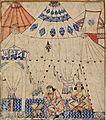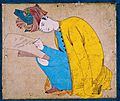Islamic studies facts for kids
Islamic studies is a term that can mean two different things.
First, it can mean studying or researching any topic in a way that fits with Islamic knowledge. This includes traditional religious subjects like Kalam (Islamic theology, which is about understanding God and religious beliefs) and Fiqh (Islamic law, which guides how Muslims live). It also looks at everyday topics, like science or economics, but from an Islamic point of view.
Second, "Islamic studies" can also mean learning about the history of Islam and Islamic philosophy (the study of big ideas). Scholars from many different fields study and share what they know about Muslim societies, both today and in the past. Some non-Muslim scholars have written important books that many Muslims read. In the past, this field was often part of "Oriental studies," but now it's more often part of Asian studies. Many universities offer degrees in Islamic studies.
Contents
What Are Islamic Studies?
Islamic studies is a wide field that helps us understand the religion of Islam and the cultures connected to it. It's like a big umbrella covering many different ways to learn about Islam.
Learning About Islam
One way to think about Islamic studies is learning about any subject from an Islamic perspective. This means understanding how Islamic teachings and beliefs influence different areas of life and knowledge.
Religious Subjects
Some parts of Islamic studies focus directly on religious topics. These include:
- Kalam: This is like Islamic theology. It's about understanding the core beliefs of Islam, like who God is, what prophets do, and what happens after death. It uses logic and reason to explain faith.
- Fiqh: This is Islamic law. It's about how Muslims should live their lives according to Islamic teachings. It covers rules for prayer, charity, marriage, business, and many other daily activities.
Everyday Topics with an Islamic View
Islamic studies also looks at subjects that might seem "secular" (not religious) but from an Islamic understanding. For example:
- Islamic Science: This explores how scientific discoveries and knowledge developed in Islamic civilizations, often inspired by religious values.
- Islamic Economics: This looks at how economic systems and practices can follow Islamic principles, like fairness and avoiding interest.
Studying Islam's History and Ideas
Another important part of Islamic studies is looking at the past and the big ideas that have shaped Islam and Muslim societies. This includes exploring how Islam grew, how its ideas changed over time, and how different Muslim cultures developed.
Who Studies Islam?
Many people study Islam, including:
- Academics and Scholars: These are experts who research and teach about Islam. They come from many different areas of study, like history, philosophy, and sociology.
- Muslim Scholars: Many scholars who are Muslim dedicate their lives to understanding and teaching Islamic knowledge.
- Non-Muslim Scholars: People who are not Muslim also study Islam. Their work helps everyone understand the religion and its impact on the world.
In the past, non-Muslim scholars in this field were sometimes called "Islamicists," and their studies were often part of "Oriental studies." Today, this field is more commonly seen as part of Asian studies, reflecting a broader and more modern approach. Many universities around the world offer special courses and degrees in Islamic studies.
Images for kids
See also
 In Spanish: Estudios islámicos para niños
In Spanish: Estudios islámicos para niños
 | May Edward Chinn |
 | Rebecca Cole |
 | Alexa Canady |
 | Dorothy Lavinia Brown |




